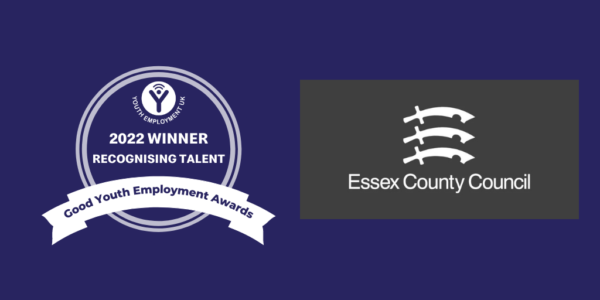Essex County Council are the winners of the 2022 Good Youth Employment Awards for RECOGNISING TALENT. See their case study below for best practice.
About the Good Youth Employment Awards
Every year, youth employment experts Youth Employment UK hold the Good Youth Employment Awards at the Good Youth Employment Symposium. It’s an annual opportunity for HR leaders and decision makers to gather to achieve best practice with regards to youth attraction, engagement and retention.
Every year, organisations are invited to enter for the Awards in five categories relating to the core principles of good youth employment:
RECOGNISING TALENT Winner 2022:
Essex County Council
What activities have you undertaken to improve your business practice?
Within ECC we have three job interview schemes (disability, care leaver and veteran/reservist) which allow applicants who identify as one of the above to be guaranteed an interview if they meet minimum requirements. We also provide extra support/advice during the process for the applicants.
Our social mobility strategy is reflected in our twenty commitments, which is a renewed commitment to addressing inequalities and levelling up life chances for our residents – it demands that we address all the issues that shape a person’s life chances. That is why levelling up is embedded in our plan across all our new strategic priorities and why ECC will continue to drive this forward.
Furthermore, the Entry to Work welcomed over 210 colleagues into ECC via their pathways during 2021, including individuals from areas of deprivation and care leavers. Across all programmes our objective for 2022 is to welcome 355 new colleagues into ECC.
We have also introduced T Levels and Career Insight Days (specifically targeted at students within schools who received high Pupil Premium Funding), along with Traineeships (for those with little or no work experience an educated to Entry Level 4).
The programmes we have introduced this year, continue to show that ECC are committed to levelling up the employment opportunities for our younger residents.
For example, our VWEx programme was aimed specifically at secondary schools within Essex in receipt of high Pupil Premium Funding (PPF). The programme targeted Clacton Coastal Academy who receives 55.3% of funding, compared to the County average 22%.
We also placed 96 individuals on the Government Kickstart scheme which was aimed at 16-24 yead olds, who are at risk of long-term unemployment. We have seen a 68% retention rate for those who have finished their initial 6-month contract within ECC.
In September 2022, we launched our Neuro-diverse Internship – a 12-week paid placement for those with a diagnosis of Autism. To ensure we highlighted our commitment to breaking down barriers for those with disabilities, we titled each advert as ‘Neuro-diverse Internship’ – this in turn saw an increase in applications by 800% from the 2021 campaign. Furthermore, when speaking to our Interns, the majority have said that the reason they applied was due to the fact that we were highlighting the programme was specifically for them.
When on their internship, each Intern has at least three work buddies who support them during the day with their tasks. The ETW team also hold regular check-ins with the Interns to discuss their placements ad discuss any concerns (work related, however sometimes personal related).
We understand the importance of preparation before a launch of a new entry pathway, as such we worked with Ambitious About Autism who delivered Autism Awareness training to all line managers, work buddies, wellbeing champions as well as the ETW Team. The training was hugely beneficial for all parties and ensured confidence amongst those who support the Intern.
Due to the nature of Traineeships, applicants will have little to no work experience and low academic grades. Therefore, the ETW team did not ask applicants for CV’s, instead we opted for a short sentence as to why they would like to apply. This was the first time ever within ECC that the requirement of a CV was removed. Our screening process involved a call (at a pre-arranged time) to complete a vocational profile, which allowed us to delve deeper into the motivation around applying and the applicants preferred learning style and environment.
What improvements have you seen?
We have seen various improvements; the use of vocational profiling was a huge success with 0% drop-out rate for our Traineeship programme. As such, we have introduced profiling for our Neuro-diverse Internships and T Levels as screening tool.
Internally, the ETW team are also working with the ED&I Lead to discuss implementing Vocational Profiling within the wider business.
Of the graduates who undertook the 2022 Legal Virtual Work Experience programme, 50% of applicants who disclosed a disability, 5% disclosed they were a care leaver and 55% were ethnically diverse.
In October 2022 we plan to hold our first Career Insight Day, specifically for Essex based care leavers. The event will highlight how ECC assist care leavers into employment within the organisation as well as offering work experience placements, 6 months’ free digital connectivity items (laptop and broadband) and a personalised career guidance session with report.
Have these activities helped provide employment and/or learning and development opportunities for young people facing barriers to employment?
The 2022 graduate recruitment campaign saw an increase in applicants for those with a disability – this was up to 2% YOY.
We also saw a 2% increase in applicants from an ethically diverse background up from 55% to 57%.
Furthermore, ECC are working with 10,000 Black Interns and have recently pledged to have a minimum of 5 blank interns within our Corporate Services function in 2023.





